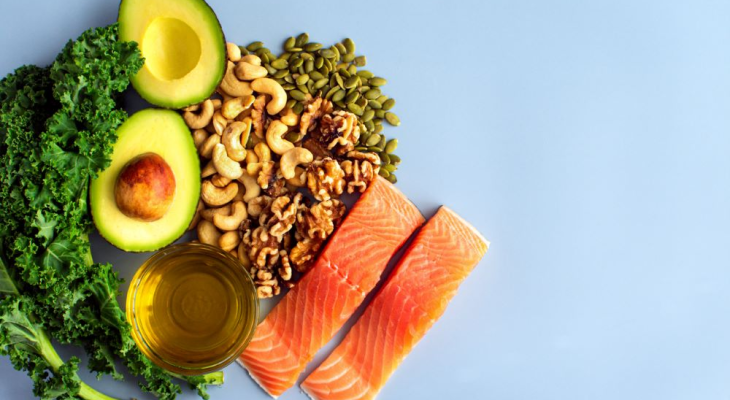Proven Benefits: How a Mediterranean Diet Eases 5 Menopause Symptoms

The Mediterranean Diet and Menopause Symptoms – Nutritionist reveals how the diet has been proven to reduce symptoms
The British Nutrition Foundation conducted a study on the role supplements play in reducing menopausal-related symptoms.
Women who are unable to take HRT or choose to not do so may explore alternative options such as dietary changes and nutritional supplements.
A healthy Mediterranean diet is the key to relieving symptoms
In the scientific literature, and in expert positions statements, little attention has been paid to diet and supplements. It is still believed that a healthy diet can help women through the menopause.
The BNF study went deeper to see if specific dietary changes can impact menopause symptoms and aid in its management.
What is the Mediterranean diet and how do you follow it?
The Mediterranean diet is a healthy combination of grains, fish, chicken and red meat, as well as good fats like olive oil, avocados, and olives.
- Choose healthy fats such as avocado, olive oil, nuts, seeds, and oily salmon.
- Limit your intake of red meat and avoid processed meats. Instead, choose lean proteins such as fish, poultry, Quorn or tofu.
- Fruits and vegetables are good for you. Include five portions of vegetables that are not starchy in your diet every day.
Symptom #1: Hot Flushes
Hot flushes can be described as a sudden feeling of warmth that begins in the chest or face, and then spreads throughout the entire body.
The same symptoms are also known as vasomotor. Most commonly, these symptoms occur during menopause. The severity of the symptoms can be affected by smoking, alcohol consumption and body weight.
Hot flushes is a sudden feeling of heat in the chest or face.
According to research, a diet high in fruits, vegetables and wholegrains with a higher intake healthy fats such as oily fish and nuts may help reduce these symptoms.

In a study of more than 6000 women, it was found that eating a high-fat and sugar diet increased the risk for vasomotor symptoms.
The study found that following a Mediterranean-style diet reduces the risk of symptoms in a similar way.
Recent research has shown that women who follow a plant-based diet experience fewer menopausal symptoms.
Isoflavones mimic the effects of oestrogen, but have a much lower impact. Beans, chickpeas lentils and soybeans contain these compounds.
Researchers have studied the effects of specific isoflavones in soy foods on hot flushes. Daidzein genistein, and glycitein are some of the specific isoflavones that can be found in soy food.
Isoflavones mimic the effects of oestrogen.
The Cochrane Review of Evidence for the Use of Isoflavones concluded that administering genistein (30-60mg/day for 12 weeks up to two years) showed a reduction in hot flushes by 24 to 56%.
Try Healthspan’s Soy Isoflavones (PS17.95 per 120 tablets). These supplements are not recommended for women at higher risk of developing breast cancer.
Read more about Fatigue Feeling cold? Feeling cold? You may have thyroid issues if you notice these signs.
Symptom #2: Weight Gain
Menopause is not a cause of weight gain. The fluctuating levels of oestrogen, progesterone, and estrogen can cause fat to be stored faster after menopause. This is especially true around the midsection.
It is easier to gain weight than to lose it because the body has to work harder to convert calories to fat.
The loss of muscle mass can be exacerbated by other changes such as a higher level of follicle stimulating hormone in conjunction with oestrogen deficiencies.
The body can burn fat more quickly if the levels of oestrogen or progesterone fluctuate.
A review of 11 clinical studies concluded that diets involving reduced daily caloric intake and a low-fat lifestyle were effective in reducing body mass during menopause.
Exercise, which promotes increased muscle mass, can enhance the results.
Weight loss regimens are adhered to differently by different people. The best way to lose weight is to find a plan that fits your lifestyle and works for you.
Women who are on a diet to lose weight should include enough protein, particularly if they want to maintain their muscle mass through menopause.

Osteoporosis Symptom 3
Oestrogen, which helps to preserve calcium and prevents bone breakdown, is disrupted by hormonal changes during menopause.
Recent research has shown that oestrogen is not the only factor at play. Recent research shows that lower progesterone in perimenopause can also disrupt the natural process of bone repair and breakdown. This can lead to a decline in the health of bones over time.
Calcium is important for maintaining bone density and strengthening the bones. You should follow the guidelines for calcium-rich food consumption (3-4 servings per day), which includes dark green leafy veggies (but not spinach), seeds, nuts, dried fruits, tofu and tinned salmon with bones, as well as dairy products such milk, yogurt and cheese.
Calcium is necessary for maintaining bone density and strength.
Vitamin D is necessary for calcium absorption.
All groups of people, including women in menopause age, are lacking vitamin D. Winter is the best time to supplement vitamin D because there’s less sunlight.
Women with osteopenia or low bone density who do not have access to HRT may still be advised to take supplements all year long.
Try Healthspan Oseo Complete,PS18.95. It contains vitamin D, Boron and calcium, magnesium, and copper for bone health.
Smoking and excessive alcohol consumption (for men and women, no more than 14 units per week) are also risk factors for heart disease and osteoporosis.
Most bone loss occurs one year before or two years after the last period of a woman
According to research, the majority of bone loss occurs one year before a woman’s period and two years afterwards. These three years represent an important window of opportunity for you to protect your bones.
Avoid diets that drastically reduce carbohydrates, and instead focus on high protein and fat intake. This can lead to further calcium loss in urine.
Weight loss can be achieved by a balanced approach that does not focus on cutting out food groups.
Read more: Are you at high risk for osteoporosis. Three ways to maintain healthy bones

Symptom 4 Depression
It is believed that hormonal changes are responsible for the increased risk of depression during perimenopause.
Improved diet quality could improve several physiological processes that are involved in depression. These include inflammation and oxidative stresses.
A diet consisting of whole foods, such as whole grains, fruits and vegetables, can ensure that the body is receiving nutrients which act as anti-inflammatories and antioxidants.
Depression is more common during perimenopause
In a large meta-analysis involving ten clinical trials, phytoestrogens were found to significantly reduce depressive symptoms among postmenopausal woman compared with a control. This study showed that isoflavones are more effective than lignans.
According to research, Omega 3 could help reduce depression. A review of 35 studies concluded that omega-3 supplements may have a moderate to small effect on depressive symptoms among people with depressive disorders.
Read more: Tired all the time? These 7 super supplements will boost your brainpower.

Symptom #5 Disturbed Sleep
During menopause, poor sleep quality is often reported. Premenopausal, perimenopausal, and postmenopausal woman are more likely to experience poor sleep quality.
The disorder of disturbed sleep can be primary, but it can also be secondary due to other symptoms like hot flushes or night sweats. Depressed mood is largely explained by the relationship between bad sleep, hot flushes and night sweats.
A balanced diet can help you sleep better, in part due to the positive effects on your body weight. This is because it helps to improve your sleep.
A balanced diet can help you sleep better
Researchers have found that inflammation and elevated markers of this affect sleep efficiency and quality (ratio of time spent in bed to total sleep time).
The Mediterranean diet is linked to better sleep and helps reduce these markers.
Herbal supplements can be used to promote sleep. They are mainly focused on reducing anxiety. Valerian is known to have a sedative action due to its ability to inhibit enzymes which break down the inhibitory chemical in the brain called Gamma-aminobutyric Acid (GABA). GABA levels increase, which dampens over-stimulation and anxiety-driven thinking.
According to research, the best diet for menopause involves a plant-based Mediterranean diet.
Some foods and supplements may be beneficial to menopausal symptoms.
The BNF study concluded that there was no “magic bullet” and there are still unconclusive studies on herbal remedies and supplements when it comes treating menopause symptoms. However, women can help ease some of these symptoms by making small changes to their diet.
Rob Hobson has been a registered nutritionist for over 20 years and is also a sports nutritionist.
He is a Nutrition Consultant for several brands. He also works one-on-one with private clients.
HEALTHISTA’S ANSWER TO MENOPAUSE; MENOSTART: PRESS PLAY, NOT PAUSE.
The Healthista Menopause pack is an online video workshop led by Dr Dawn Harper. It’s affordable, accessible, and covers all aspects of menopause for those in need.
This online resource, which includes information and advice from seven menopause experts who are respected in the industry, is designed to help women deal with common challenges and changes they may face before, during and after menopause.










